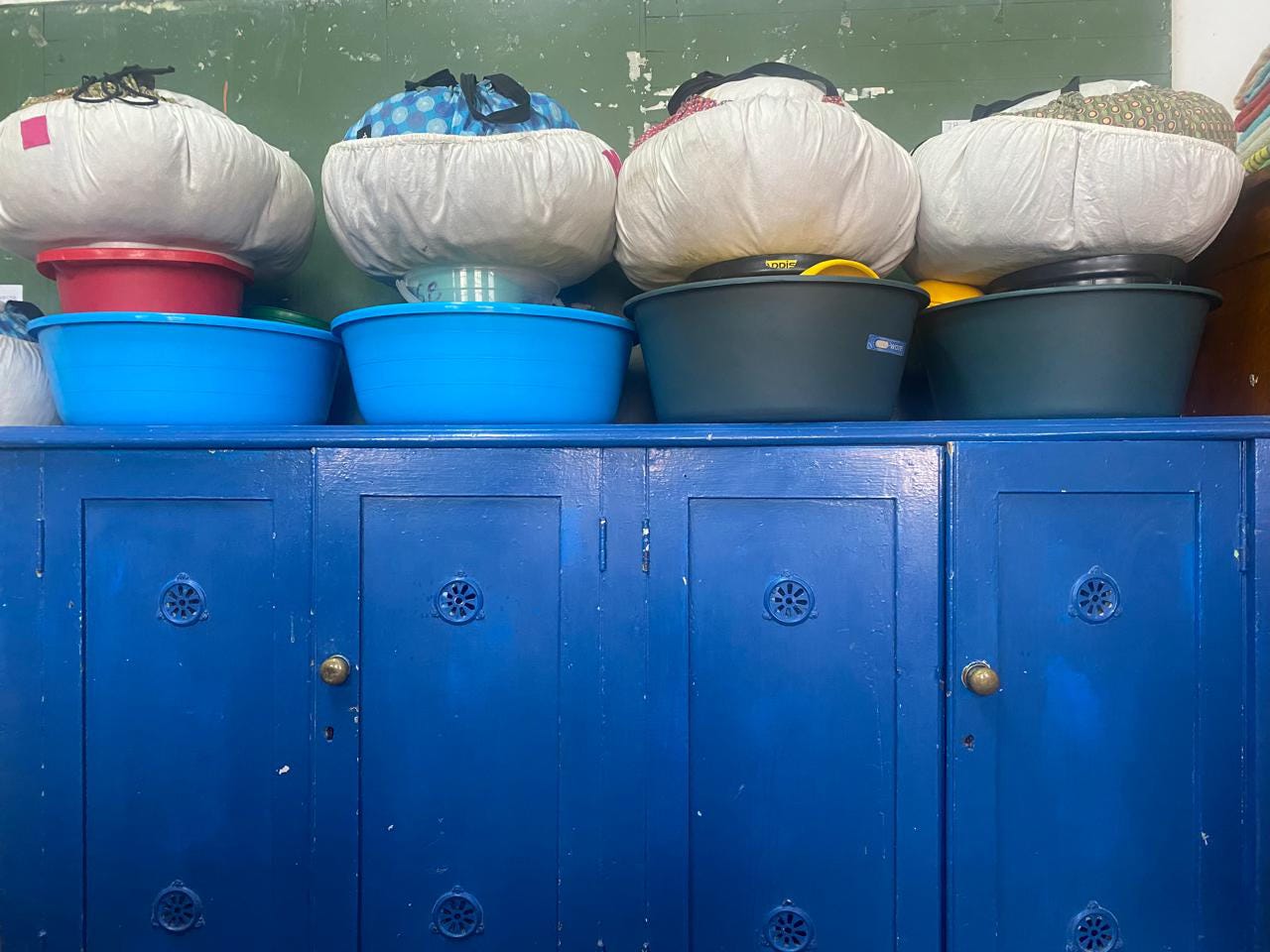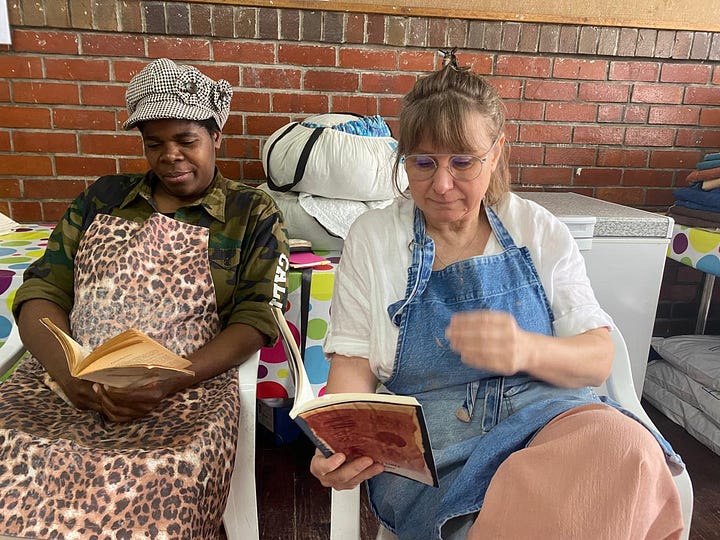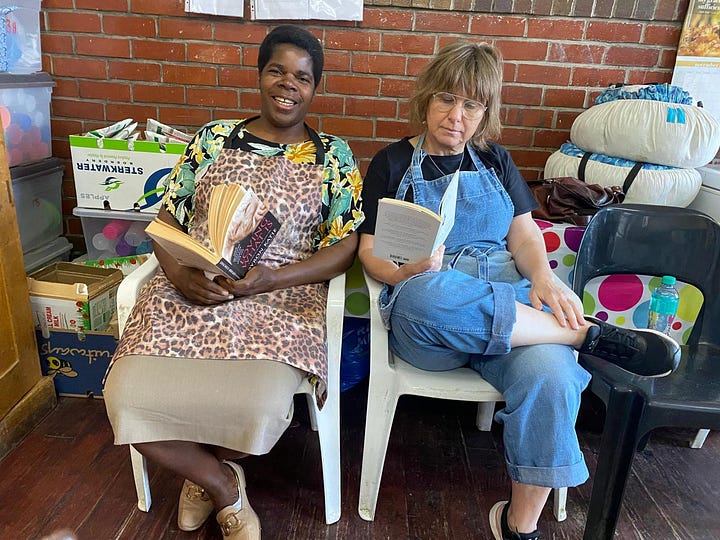Since I wrote The Connoisseur of Chaos in late January, I’ve been asked a few times why I wash teaspoons on Friday mornings. I’m going to tell you today. But first, a quick story that ends with an invitation.
Have you ever wanted to do forest bathing?
Some years ago, crushed by life and hanging on by my toenails (as one friend put it), a man came up to me at the end of a Nia class and said, ‘You’re Karin Schimke, aren’t you?’
He knew me from my byline picture in the newspaper. He’d also worked at the Cape Times and I knew his name: Evelyn John Holzhausen. For a period, he and two of our other journalist friends, spent a lot of time together. Evelyn is a mountain guide – a really good one – so we did a lot of hiking.
Hiking is healing. So is community.
I bumped into Evelyn for the first time in years on Saturday. I asked him whether he was still so fit and whether he still hiked as much as he used to. Yes, he does. And also, he started taking groups on four-hour forest bathing walks, he told me.
I’m not usually this direct, but I said to him: ‘If I get a group of ten people together, will you give us a special price?’ He said, ‘Of course.’
So, paid subscribers, do you want to come forest bathing with me? Evelyn is offering it to us at R350 instead of R450 per person. Please come! I can’t think of a nicer way for us to spend time together than in Evelyn’s calm presence, walking in a forest.
Details
Date: Saturday, 3 May 2023
Time: Noon to 4.30pm
Where: Entrance to Newlands Forest
Bring: Walking shoes, a warm top and a towel or blanket to lie on
Snack: Evelyn will provide honey and ginger tea and some nuts after the mindfulness session.
(More details direct to forest bathers once I have confirmation who is coming.)
Send me a message or reply to this email to get your name on the list.
Stirring pap and washing teaspoons
Friday mornings have a rhythm and pattern that is soothing. Whatever is happening out in the world, or in the intimate tangles and minor dramas of individual life, there is Breakfast Club predictability.

The comfort is in the machinery of many hands making light work. The ineffable beauty is in the dance of every person knowing the next step and the next beat, even when the music changes, or the troupe is bigger or smaller than usual.
When I walk into what used to be a classroom that is now the operations room for Breakfast Club at Good Hope Seminary Junior School at 7am on Fridays, there is Violah, near the window, cutting apples in summer and oranges in winter.
At the furthest of the two long tables that are the focus of every school morning’s industrious preparation and cleaning to feed about 370 children, Linda is standing with her back to the blackboard. Marlene, opposite her is facing it. Sometimes, Sophie is there too, standing in when someone can’t make it.
I take up a spot at the long table, get a bowl from a pile and a packet of instant porridge called e’Pap. I add a litre of boiling water and half a litre of milk, and I stir. Nicola arrives and starts to stir too. We all stir and stir until 14 bowls of pap are lump-free. The bowls are wiped, lidded and stuffed into that remarkable South African invention called a Wonderbag.
When the stirring is done and the bowls have been tucked into their warm round beds, the table is cleaned and wiped, and the implements are washed at another long table. Violah sweeps the floor. Christina brings a kettle for tea and coffee, filling large washing basins as she goes along. Linda is stuffing strips of cut-up e’Pap bags into two-litre soft-drink bottles with a long stick to make ecobricks. Someone is carrying in two five-litre bottles filled to the neck with tap water to place under the two urns that heat the water for washing the dishes when the kids are done.
In the corner, on an old couch covered in a sheet, a child is often asleep. Usually, it’s a boy. Sometimes there’s a learner doing maths homework on the couch. These learners are the class representatives who volunteer for Breakfast Club. It’s important work. It requires not just fetching and carrying, but tallying and recording.
When the bell rings, the class volunteers stream in and take the basins with the pap to their classrooms.
You forget how tiny Grade 1s are. Big, bewildered eyes in bodies so small they’re drowning in the uniforms. The older kids are rowdier and more confident. I am struck by how often I see older children helping younger children at this school. You know bullying exists everywhere but what’s apparent on the surface here is a sweetness and solicitousness that seems a far more natural human state.
Marlene is crowd control and logistics manager. It may or may not be the role she was assigned, but it’s the role she’s constitutionally perfect for. She knows the kids, many of them by name. She tracks who takes what and whether it tallies with what they bring back. She reminds them to write down the numbers. She feeds the latecomers. She makes sure the learner volunteers eat before they head back to class. If there are fruit slices left, she urges them to take more, a treat they never turn down.
Now and again, Marlene’s voice erupts over the din: ‘Hayibo, bhuti! I told you last week mos…’
Afrikaans, English and isiXhosa mingle and mix here. It’s possibly less smooth than the e’Pap, but its lumpiness doesn’t hamper communications.
In the small hiatus between porridge dispatch and the return of dirty bowls, Nicola makes tea and coffee for the team and a biscuit tin is brought forth. Viola sometimes sits beside me and we both read while we wait for the dirty dishes to be returned.


Margie arrives. Then Bianca. The kids bring the basins back. I take up my spot at the end of the first table. One basin is filled with foamy hot water, the other with clean water for rinsing.
The spoons get dumped into the soapy bowl. Hundreds of plastic spoons float among the bubbles. I’m the spoon washer. Linda usually takes care of the dishing-up implements. Violah and Nicola double-wash and rinse the bowls. Margie and Bianca dry. The whole thing is a well-oiled machine. When one person finishes a job, they take up slack at another station.
Sometimes Bianca bursts into song and people join in on the lyrics they know. Snippets of valuable information are passed along. Shops that sell this or that obscure thing. Recipes. Best apps, best specials. Which local organisation is collecting what kind of thing. What’s on at the theatre. At some point, the school caretaker will come to talk to Christina about races. They are both runners. They are both doing the Comrade’s this year.
Marlene commands and directs the younger troops wafting in and out.
By 8.30, the basins are empty and dried. The bowls and spoons have been counted out into each class’s basin for Monday morning. The towels under the wash basins have been hung out to dry and replaced with new ones. The dish towels are draped over the wonky laundry stand. The cupboards are locked.
Sophie has two ice-cream tubs of leftover e’Pap. She’s going to give it to the people who live under the bridge on her walk home.
The kids are in their classrooms, fed.
Whatever other things might hamper their learning today, hunger isn’t one of them.
(There is no website for Breakfast Club. Below the poem, there is some factual information about why Breakfast Club exists and how it runs.)
Here is a poem by Marge Piercy I think you will like.
To be of use
The people I love the best
jump into work head first
without dallying in the shallows
and swim off with sure strokes almost out of sight.
They seem to become natives of that element,
the black sleek heads of seals
bouncing like half-submerged balls.
I love people who harness themselves, an ox to a heavy cart,
who pull like water buffalo, with massive patience,
who strain in the mud and the muck to move things forward,
who do what has to be done, again and again.
I want to be with people who submerge
in the task, who go into the fields to harvest
and work in a row and pass the bags along,
who are not parlor generals and field deserters
but move in a common rhythm
when the food must come in or the fire be put out.
The work of the world is common as mud.
Botched, it smears the hands, crumbles to dust.
But the thing worth doing well done
has a shape that satisfies, clean and evident.
Greek amphoras for wine or oil,
Hopi vases that held corn, are put in museums
but you know they were made to be used.
The pitcher cries for water to carry
and a person for work that is real.
Breakfast Club
Patsy Bagraim was involved in a literacy programme at Good Hope Seminary Junior School in 2016, but one learner she was supposed to be helping wasn’t responding like the others were. With her confidence waning, Patsy turned to colleague, who tested the child and came back with a simple answer: the child couldn’t concentrate because she was hungry.
That evening, Patsy and her husband were having dinner friends visiting from the UK. When she told them this outcome, her friends said she had to start feeding the children.
Which is easy to say, but these friends even offered to provide the seed money for a project to feed all the children at the school. If you were going to feed one child, says Patsy, you needed to feed them all.
She approached the school’s remedial teacher Aletta Ashmore, who’d discovered an instant porridge fortified to specifically address ‘hidden hunger’ – which is when someone may get enough calories in, but not enough of the micronutrients required to thrive. Together, they started Breakfast Club.
‘Aletta was hands-on and set up the skeleton of the Breakfast Club,’ says Patsy. ‘It used to take us four hours. Now at 360–370 learners, it takes us two-and-a-half hours, after much refining.’
Over the past nine years, the Breakfast Club has served approximately 700 000 breakfasts. The daily operations are run by four employees who earn a small stipend for every day they are at the school during term times, and around 22 volunteers who come in to help stir pap and wash and dry the dishes. Patsy has a friend, Mandy Trollip, who does an enormous amount of work and is, in essence, her partner in the undertaking. Aletta has since started another Breakfast Club at a school in the city.
The learner volunteers are also important to the success of the club and their help is recognised at a party at the end of each year where they get a certificate to add to their school records. One of these volunteers went on to become the head girl at both the junior school and the high school she went to, and eventually also received a bursary to study law at the University of Stellenbosch.
Whenever I have asked her questions about Breakfast Club, I’ve noticed Patsy talks about what other people do, not what she does.
I don’t know Patsy well at all, since our Breakfast Club shifts don’t overlap, but the little I do know seems to tell me this: you don’t need great riches and a huge ego to do something worthwhile where you are. You do need to talk to people, ask for help, and get stuck in.
One of the greatest sources of help for Breakfast Club has been the high-functioning neighbourhood Facebook group where I’d read that Breakfast Club needed another volunteer. When something is needed, Patsy informs the formidable head of that group, who passes on the message. The troops always rally when a call comes.
You probably also need a sense of humour for this kind of work, where the need you are meeting is a fraction of the need that exists. Patsy seems to have bucketloads of humour. The last time we spoke, she and I were practically double-over with laughter outside the school building about a very amusing mistake she’d made.
And that is the story of the Breakfast Club, the place where, on Fridays, I wash teaspoons.
Lots of love to all of you, till next Friday,
K.




The reason you wash teaspoons on a Friday is so much better than I ever imagined! What a wonderful story, supplemented with a poem, told in your characteristically down to earth voice. A treat of a read in all kinds of ways 🤎
So wonderful, Karin — and I imagine the weekly ritual of being USEFUL in such a meaningful way is an emotional anchor of sorts.